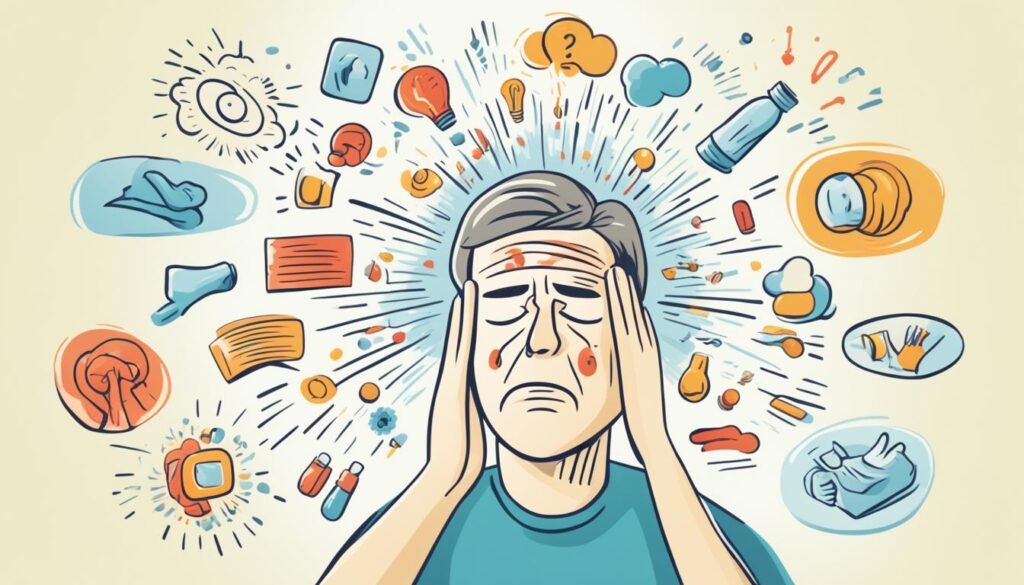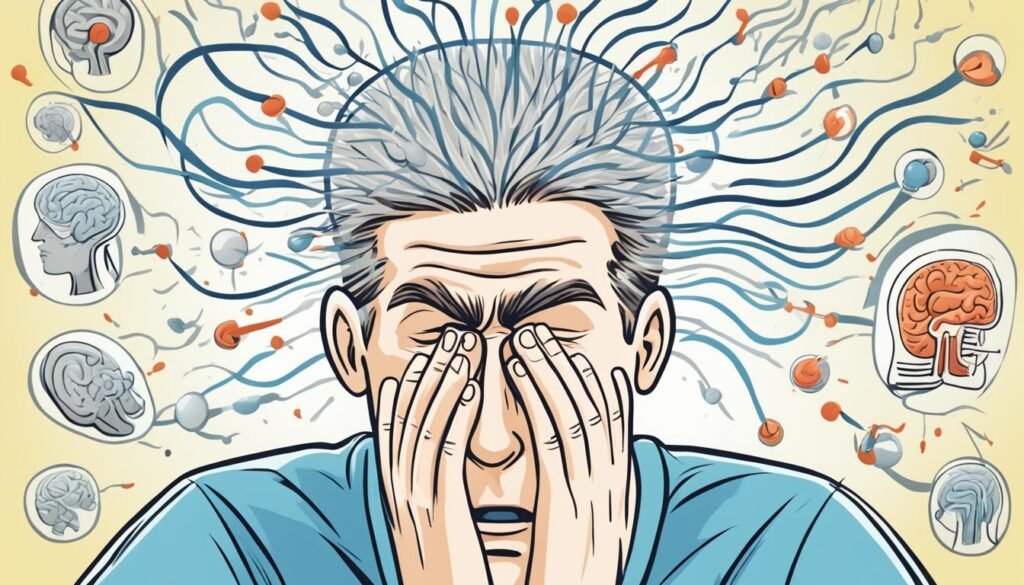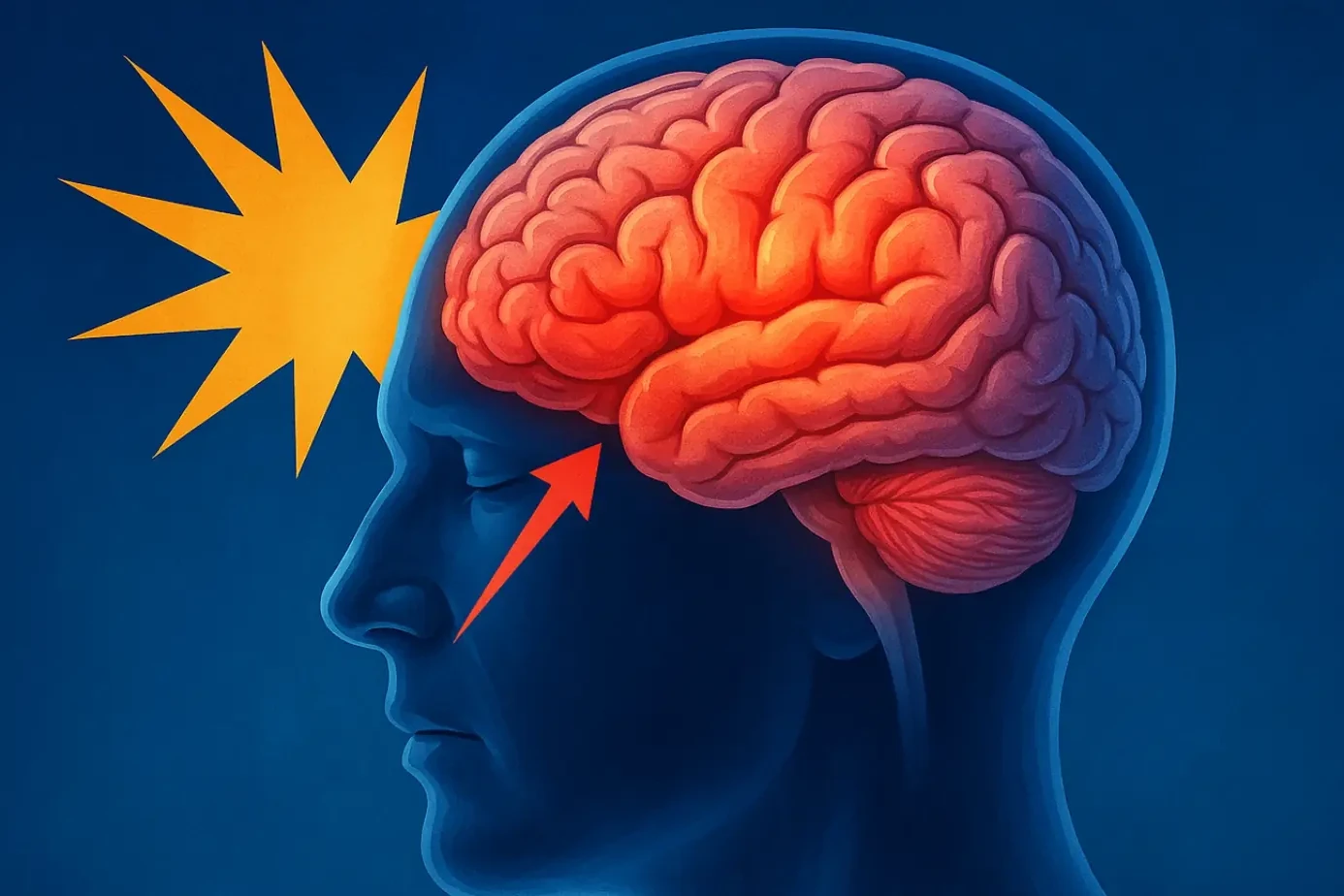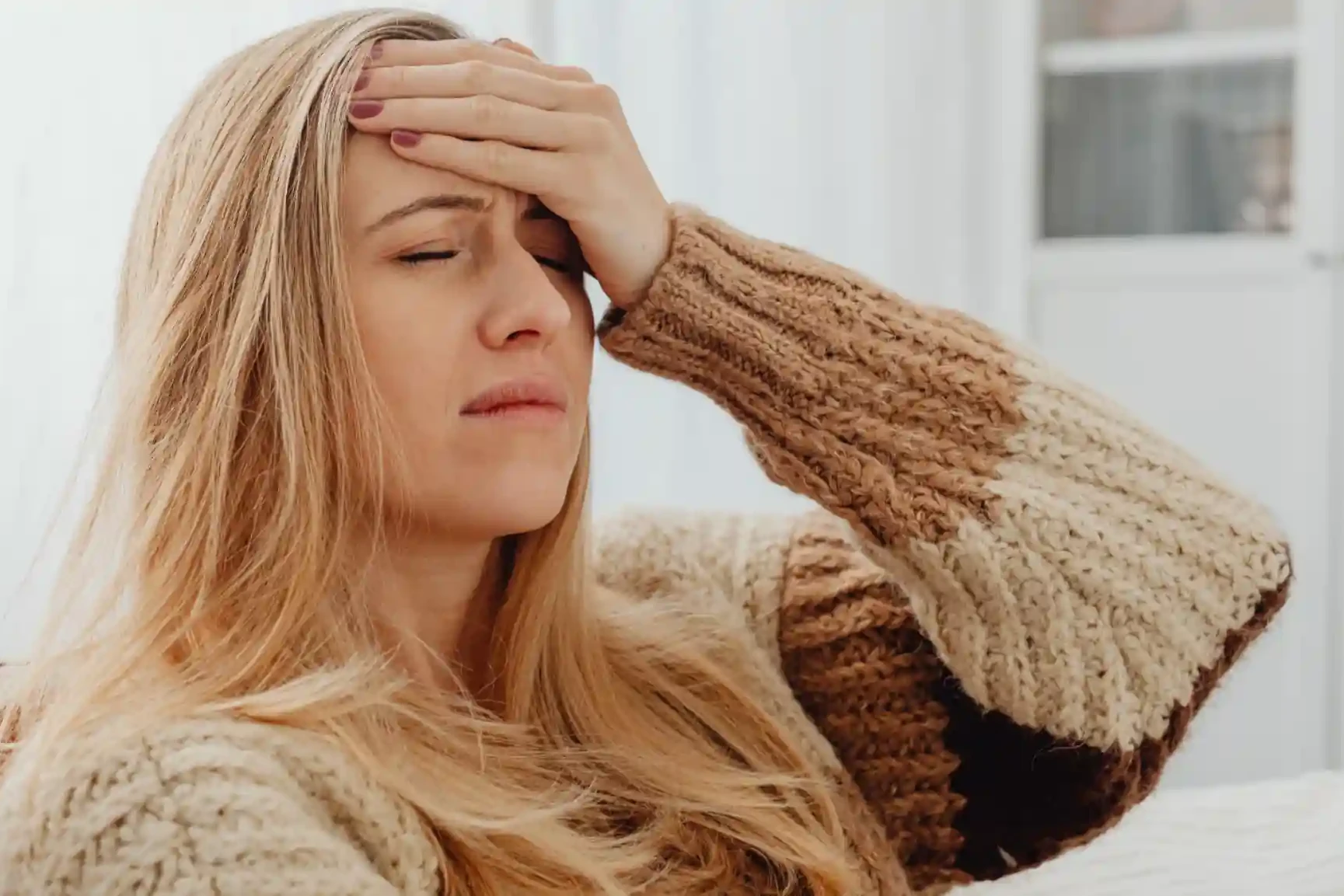A concussion is a light traumatic brain injury that impacts the brain function. This leads to short-term issues including headaches, problems focusing, remembering things, keeping balance, changes in mood, and sleep. Concussions happen from a hit to the head or body, affecting brain activity. But not all hits result in a concussion.
Some people may briefly lose consciousness due to a concussion, but this is not always the case. Falls are the top reason for getting a concussion. They’re also common in sports where players can collide, like American football or soccer. Luckily, most folks make a full recovery after a concussion.
Table of Contents
ToggleUnderstanding Concussion Symptoms
Concussion symptoms are often hard to spot and can be small. It’s very important to know the signs in the body, mind, and feelings. This helps doctors diagnose and treat concussions well.
Physical Symptoms
Physical signs of a concussion include headaches and ringing in the ears. People might feel sick, throw up, be tired, or have trouble seeing. These signs might show up right away, or they could come days after the injury. Watching for any change after a hit to the head is key in finding a possible concussion.
Cognitive Symptoms
Besides the physical, concussions affect thinking too. People might feel lost, not remember the injury, or be dizzy. They might even see flashes of light. These signs can make it hard for someone to focus or remember things clearly.
Emotional Symptoms
Concussions also mess with your emotions. This could make someone very moody or sad. Changes in how someone acts or feels are important signs to watch out for.
It’s key to remember that concussion signs can be different for everyone. And they don’t always show up right away. Kids and babies might act spacey or too quiet and sleepy after a bump. They might cry more or eat and sleep differently. Paying attention to even the little changes in body, mind, or mood is crucial for finding and treating a concussion right.

Concussion symptoms in Athletes
Concussions are a big worry for athletes in contact sports. It’s very important that if someone gets a concussion, they don’t play again that day. They need to slowly get back into things, both schoolwork and sports, with a doctor’s help.
Return to Play Protocol
The step-by-step plan to get athletes back in the game after a concussion is called a return to play protocol. It’s all about taking small, safe steps that steadily add more challenge. This way, athletes can safely come back to their sport while keeping an eye out for any problems.
Prevalence in Different Sports
Research from the University of Pittsburgh’s Brain Trauma Research Center shows over 300,000 sports concussions happen each year in the U.S. The chance of getting a concussion in a contact sport is pretty high—up to 19% in a year. Football and soccer have similar concussion rates, with thousands happening in high school sports alone.
Diagnosis and Evaluation
If a concussion is suspected, a doctor will do a full checkup and might suggest scans like MRIs or CTs. These tests can help spot any physical damage. But, scans aren’t always needed. They might not show much, and CT scans can add to a person’s exposure to radiation.
Neurological Examination
Next, the doctor looks closely, asking how the injury happened. They want to know about the impact and any symptoms now. It’s key for patients to share everything odd or troubling. This helps the doctor understand the concussion’s seriousness and plan the best care.
Imaging Tests
Scans like MRIs or CTs might not be essential right away to diagnose a concussion. They’re often used to rule out other big troubles, like skull breaks or bleeds. The doctor will look at the symptoms, what happened in the past, and the injury details to confirm a concussion.

Treatment and Management
The best way to treat a concussion is by resting. Both your body and mind need rest for your brain to recover. It’s not helpful to rest too much, though. This can make your recovery time longer. Try to do light activities that don’t make your symptoms worse. Avoid aspirin and NSAIDs; they might hide your symptoms and make bleeding more likely. Instead, use acetaminophen for pain relief.
Rest and Recovery
After getting a concussion, it’s vital to rest physically and mentally. This means not doing things that need a lot of thinking, like studying or using electronics. Also, avoid physical activities that might cause another head injury. By resting, your brain gets the chance to heal.
Gradual Return to Activities
Once you start feeling better, you can slowly pick up your normal activities. But, make sure a healthcare pro is guiding you. This includes going back to school or work and doing physical stuff. Each step must be checked to make sure you’re not pushing too hard. The aim is to get back to your usual routines without stressing your brain too much.
Rehabilitation Strategies
Helping your brain heal after a concussion might involve vision therapy, balance exercises, and cognitive games. Vision therapy improves how your eyes move and see, while balance training boosts coordination and lessens dizziness. Cognitive games can sharpen your memory and focus. A plan that fits your specific needs is key to getting better fully.

Conclusion
Concussions can seriously affect our bodies, minds, and emotions. But with the right care, most people can fully recover. It’s key to stop concussions with proper gear, safe playing, and knowing the dangers. Though many concussions get better in 14-21 days, some might last longer if not managed well.
To get better, it’s important to see a doctor and slowly go back to normal activities. Recognizing symptoms early and following a recovery plan can help a lot. It’s crucial to prevent concussions and take care of our brains for a happy, safe life.
We’re learning more and more about concussions. Our job is to teach others, push for safety, and help research get better. Together, we can prevent concussions and make sure everyone values their brain health.
FAQ
What is a concussion?
A concussion is a mild brain injury that affects how the brain works. Its effects are usually short-term. People with concussions might have headaches and problems with memory and balance. They might also struggle with mood and sleep.
What are the common symptoms of a concussion?
After a blow to the head, concussion symptoms might not show up right away. You might get a headache or feel sick. Other signs can be feeling sleepy or not seeing clearly. You might also find it hard to think, remember things, or feel dizzy.
Finally, you might feel irritable, sad, or different in some way.
How common are concussions among athletes?
Athletes in contact sports often get concussions. In just one year of playing, a player might have a 19% chance of getting a concussion. This risk is similar between football and soccer.
About 62,000 high school athletes and 34% of college football players get concussions each year.
How are concussions diagnosed?
Doctors check for concussions with a neurological exam. They might also do imaging tests, like MRI or CT scans. But, these scans are not always needed, as they might not show much. Plus, CT scans give off radiation, which is bad if it’s not necessary.
How are concussions treated and managed?
The best way to treat a concussion is to rest, both physically and mentally. You should slowly get back into activities, like school or work. This step is important and needs to be overseen by a healthcare provider. They might also recommend specific therapies to help with symptoms.
Source Links
About The Author

Medically reviewed by Dr. Chandril Chugh, MD, DM (Neurology)
Dr. Chandril Chugh is a U.S.-trained, board-certified neurologist with expertise in diagnosing and managing neurological disorders, including migraines, epilepsy, Parkinson’s disease, and movement disorders. His clinical focus includes evidence-based neurological care and patient education.
All content is reviewed for medical accuracy and aligned with current neurological guidelines.




